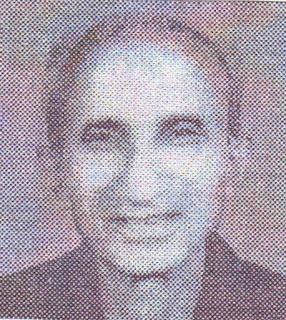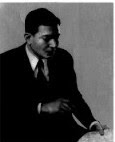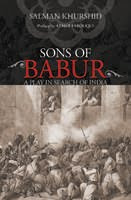The Nawab who could not settle in Pakistan!
 When India was partitioned, hundreds and thousands of families were uprooted. People left their homes and belongings to save their lives. The wealthy, educated and well connected people too changed their addresses to where they thought they would be safe, secure and able to prosper.
When India was partitioned, hundreds and thousands of families were uprooted. People left their homes and belongings to save their lives. The wealthy, educated and well connected people too changed their addresses to where they thought they would be safe, secure and able to prosper.However, there were some exceptions who were in Pakistan but chose to come back to India. And this post is about one such person. His name was Ahmad Hussain who left his job as an Information Officer with the Associated Press of Pakistan in Lahore and returned to India in 1950.
Born in 1921 in Allahabad in a Nawab family, Hussain did his MA in English and Urdu from Allahabad University. He was a descendant of Nawab Tajjuddin Hussain Khan who was a Vazir in the Awadh court. The family later settled in Allahabad. At Allahabad University he was in close contact with his teachers such as Profs Ajaz, Ehtesham Hussain of Urdu Department and Firaq Gorakhpuri of English Department.
Hussain’s father-in-law, Mohammed Hussain, was a close associate of Pandit Madan Mohan Malviya. He joined the freedom struggle, along with his brother-in-law Mubarak Mazdoor (in pic below, standing behind the girl) who was an active Congressman in his student life and a freedom fighter too from his school days.

He was very close to Firaq Gorakhpuri who had taken him as his foster son. Very soon he found himself surrounded by famous poets and writers who used to frequent Firaq’s residence. After completing his studies he joined the Press Information Bureau as a class I officer and moved to Delhi.
While first in Allahabad and later in Delhi, Hussain’s love for literature and his association with Firaq got him in close contact with Majaz, Josh, Sajjad Zaheer, Shaukat Thanvi, Shamsher Bahadur Singh (Hindi poet), Saghar Nizami, Inder Pratap Tewari, Dr Suresh Awasthi, Ram Pratap, Munish Narain Saxena, Rahi Masoom Raza, Dharam Vir Bharti, Kamleshwar, Dr Namwar Singh and other prominent writers and poets.
Hussain was deeply influenced with the leftist movement after the Russian revolution. He had a leftist leaning and was always concerned about the poor, labour class and weaker section of society.
According to his son Dr Ahmad Cameron: "As the Communist Party had been banned in Pakistan after the country came into existence, my father realized there cannot be democracy in that country as the labour, poor & weaker sections of Pakistan being ruled by landlords, zamindars etc will never be able to have a voice of their own because the party which was genuinely for them had been banned."
Thus he came back to India in 1950 and joined Hindustan Times. His other cousins and maternal uncles had also migrated to Pakistan but that did not come in front of his decision to come back to India. Interestingly, his two younger brothers, one sister and mother went to Pakistan after he returned to India. His father and elder sister though never migrated to Pakistan.
I am sure a man like Ahmad Hussain would have been a rarity. And he was very soon noticed by the political and the intellectual class. Being the only Muslim journalist in an English language newspaper in Delhi till late 1950s, the letters written by his father Mehdi Hussain, would reach him with just the following address:
Barkhurdar Ahmad Hussain Sallemahu
Akhbar Angrezi
Delhi
Feroz Gandhi who was the General Manager of Indian Express employed him for his newspaper after learning about him that though a Muslim, who consciously decided to return to India, was also instrumental in saving many Hindu families in Lahore and ensuring their safe passage to India. He also worked for the National Herald and Patriot.
For Hussain religion was a private matter and he disliked organizations exclusively using religion as a tool to reach out to people.
“I remember I had started attending RSS Shakha with other school boys of the colony when we were living at Mall Road in Delhi. He discovered it one day. He gave me a good thrashing pointing out the kind of poison RSS spreads and they were the killers of Gandhiji. But by then I had attended Shakha for about 10 days! So I have a first hand knowledge about the things that go on in Shakhas. I was in 7th grade at that time so I was not that young either! Similarly he was dead against the Jamat-i-Islami and found the two organizations as two sides of the same coin,” remembers Cameron.
Though a leftist at heart, Hussain never missed any namaz. But he would also never go to offer namaz in a masjid either, except on Eid. He taught as a faculty member at AMU’s department of journalism in early 1980s.
It was only after his death his family came to know that he used to give monthly donations to the charities of Muslims, Hindus, Sikhs and Christians which worked among the orphans. None in his family or he ever regretted returning to India.
Like him, his wife, Sardar Fatima Ahmad, was also unique in many ways. She was the first female Post Graduate of Urdu employed by Delhi Administration for teaching of Urdu language to school children, after 1947 in Delhi, who finally retired as the Principal of Govt Intermediate School.
I have always believed history is all about knowing the present better by learning about events and people of the past. If India continues to be a plural and democratic country, it is only because of people like Ahmad Hussain who was an English language journalist, Urdu language critic and Hindi poet.
He and his wife are both buried in Jamia’s grave yard in Delhi.


when and why did he go to Pakistan?
ReplyDeletedear danish, probably the first figure that you have written about who has not been impressive. The man seems to be a bit like most of us--confused about who he is or what he wants- which explains his moving to Pakistan, then coming back when he probably realised that a confused country like India would suit his type better.The part of his offering namaz despite being a leftist is precisely the kind of confusion that I'm talking about. Even among Hindus there are scores of people who will publicly try to pass off as secular- the kinds who will spout Urdu shayari etc- but at heart are just bigoted, frightened, weak-minded people. But as always, you are opening up the reader to new people, new viewpoints. Keep that going.
ReplyDeleteI wish there are more people like him who are the real role models for all of us. May his soul rest in peace.
ReplyDeleteI am overwhelmed on reading this article on knowing his background. When I met him in Delhi I did not know about his contributions to society during those troubled days more than 50 years ago! I could never make out how deep rooted is his love for humanity and weaker sections during my conversations with him. I can say from my first hand experience he lived his life in a very simple and humble manner. It is indeed rare to find such a person today who would start from scratch all over again and rise based on shear hard work, honesty, knowledge and beliefs in secular values. He is indeed a role model for our generation. I feel proud and elated knowing him.
ReplyDeleteI read the article with great interest. He contributed to the idea of a secular, democratic and pluralistic society for India. The article must get wide circulation. Excellent!
ReplyDeleteDanish Sahab,
ReplyDeleteadaab,
All three of us are extremely thankful to you for writing this article about our father. We are also grateful to those who have given comments on this write up. Papa was a man of principles who never took a penny as freedom fighter's pension and/or any other benefit just like our Mamun, Mubarak Mazdoor. We have been taught to work hard against all adversaries and give our 100% while safeguarding the interests and rights of the weaker section in the society. We found our father's friends too had similar ethos and growing amongst them we learnt a lot from those role models too. Unfortunately such a breed is slowing becoming extinct is a hard fact.
Khuda Hafiz,
Faraz Ahmad (Son)
Dr Shehla Ahmad (Daughter)
Dr Ahmad Cameron (Son)
Very inspiring piece. Returning to India is fine. Not regretting it is more significant. Managing to emboss such values amongst successors is indeed profound. One Red and one White salute to Mr. Ahmad Hussain.
ReplyDeleteYadav Chandna
HI,
ReplyDeleteYou have great work.
Keep it up
Nice article. Kept me wondering how I never knew about him; having been born an raised in a very well known muslim family of Allahabad; now settled in Toronto, Canada.
ReplyDeleteNayyar Mustafa
Mississauga, CA